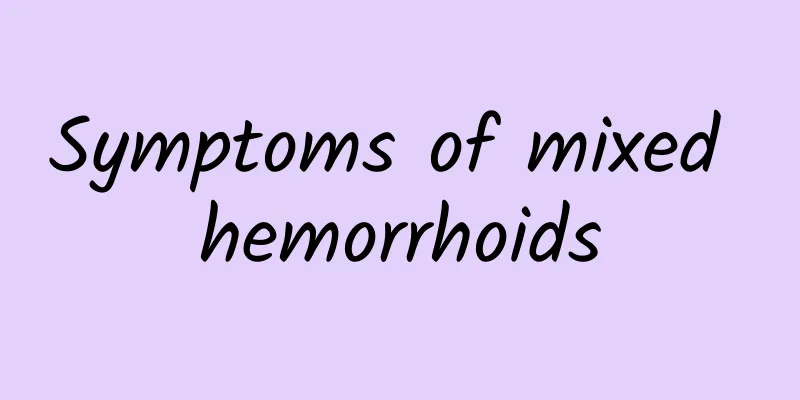Symptoms of mixed hemorrhoids

|
Mixed hemorrhoids, also known as external hemorrhoids, are a common type of hemorrhoids. Mixed hemorrhoids mainly occur above and below the dentate line in the same position as the anus. The symptoms of mixed hemorrhoids are somewhat comprehensive. For example, patients may experience bloody stools or even eczema caused by mucus overflow. 1. Blood in stool: It is characterized by painlessness, intermittentness, and the presence of bright red blood after defecation, which is also a common symptom of internal hemorrhoids or mixed hemorrhoids in the early stages. Blood in the stool is mostly caused by feces abrading the mucosa or forceful defecation, which causes dilated blood vessels to rupture and bleed. In mild cases, there is usually heavy bleeding or blood on toilet paper, followed by dripping blood. In severe cases, there is spurting bleeding, which often stops on its own after a few days. This has important implications for diagnosis. Constipation, hard and dry stools, drinking alcohol and eating spicy foods are all causes of bleeding. If bleeding occurs repeatedly over a long period of time, anemia may occur, which is not uncommon in clinical practice and should be differentiated from hemorrhagic diseases. 2. Hemorrhoid prolapse: It is often a late symptom, with blood in the stool first and then prolapse. In the late stage, the hemorrhoids enlarge and gradually separate from the muscle layer, and are pushed out of the anus during defecation. In mild cases, the hemorrhoids will only prolapse during defecation and will return to their original position on their own after defecation. In severe cases, they need to be pushed back in by hand. In more serious cases, they will prolapse out of the anus when the abdominal pressure is slightly increased, such as when coughing or walking, and the hemorrhoids will prolapse, making it difficult to return and making it impossible to participate in labor. A few patients report prolapse as the first symptom. 3. Pain: Simple internal hemorrhoids are painless, and a few may cause a feeling of heaviness and distension. When internal hemorrhoids or mixed hemorrhoids prolapse and become incarcerated, and edema, infection, and necrosis occur, there will be varying degrees of pain. Itching: In late-stage internal hemorrhoids, prolapsed hemorrhoids and relaxation of the anal sphincter, secretions often flow out. Due to the irritation of the secretions, there is often itching and discomfort around the anus, and even skin eczema may occur, which makes the patient extremely uncomfortable. 4. Mucus overflow: The rectal mucosa is stimulated by hemorrhoids for a long time, causing inflammatory exudation and increased secretions. When the anal sphincter relaxes, it can flow out at any time, causing the anal skin to be frequently irritated and cause eczema and itching. |
<<: What foods are good for hemorrhoids?
>>: What are the benefits of cupping? The benefits of cupping
Recommend
Can Huoxiang Zhengqi Water reduce fever?
Huoxiang Zhengqi Water contains a certain amount ...
What causes myocardial ischemia?
Myocardial ischemia poses a great threat to healt...
Can pregnant women use hydrogen peroxide?
We know that hydrogen peroxide is a common disinf...
How long can I exercise after intestinal polyp surgery?
As a common disease, intestinal polyps can have a...
Medicine to relieve rapid heartbeat
Tachycardia is quite common in life, and there ar...
Lumbar fracture biopsy
In daily life, people often suffer fractures in t...
What should I do if I have a lot of acne on my face?
Acne is usually caused by clogged pores, and may ...
How to treat acne caused by excessive stomach fire?
Excessive stomach fire can easily cause acne, whi...
What are the treatments for constipation in the elderly?
Constipation is a common clinical disease, which ...
What diseases can star grass cure
We can often see stars and we are all very famili...
Yellow discharge from the nipple
Yellow discharge from the nipple may be caused by...
How to distinguish eczema from ringworm with naked eyes
Nowadays, everyone starts to care about health is...
What does it feel like to have your period?
What does it feel like when you have your period?...
Mannitol for lumbar disc herniation
For many people, when treating lumbar disc hernia...
Is a pulse of 79 normal?
The heart rate directly reflects the physical con...









